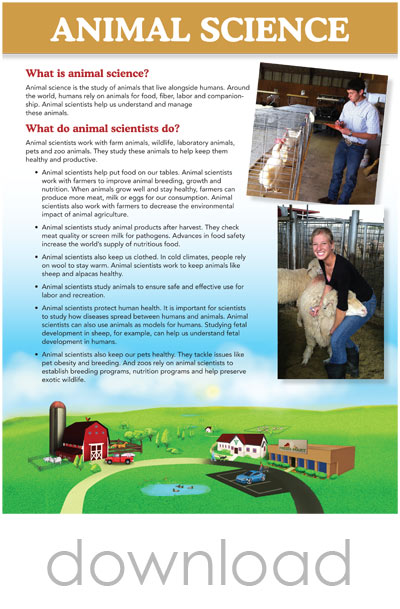Animal Science
Animal science is the study of animals that live alongside humans. Around the world, humans rely on animals for food, fiber, labor and companionship. Animal scientists help us understand and manage these animals.

Animal science is the study of animals that live alongside humans. Around the world, humans rely on animals for food, fiber, labor and companionship. Animal scientists help us understand and manage these animals.
 It’s
never too early to plan to become an animal scientist. You will need a passion for working with animals, a passion for science and a willingness to work hard in school!
It’s
never too early to plan to become an animal scientist. You will need a passion for working with animals, a passion for science and a willingness to work hard in school!
While in high school, you can gain experience interacting with animals. Organizations like 4-H and the National FFA Organization are great places to start working with animals. You could also volunteer at a local animal shelter, or try to get a job at a vet clinic or even a meat counter.
After high school, you will need to earn a university bachelor’s degree. Many people decide to major in animal science in college, but that is not the only option. Future animal scientists can major in nutrition, biology, microbiology, health sciences, food science, public health, or even genetics. It usually takes four years to earn an undergraduate degree in animal science. As an undergraduate, many students participate in internships. For example, at the University of Arkansas, students can earn course credit for volunteering during lambing season. At the University of California, Davis, students can get free housing in return for working in the pig barn.
With an undergraduate degree, some animal scientists become teachers or work in 4-H programs. Many others work in ranching. There are also two to four years programs to become veterinary technicians.
Many animal scientists continue their education by getting their master’s degree. A master’s degree would help you become even more qualified to work as an animal scientist. Master’s students also get to focus on a specific research project. A master’s degree usually takes around two years. After earning a master’s degree, some students stay and earn a PhD. Earning a PhD after a master’s degree takes an additional three years.

Through the Jr. Animal Scientist magazine and special online resources, kids can learn about pets, farm animals and zoo animals. Scientific information is tailored for kids ages 5 to 9 (K-3rd grades). Eye-catching photos and exciting animal activities add to the fun! Plus, all Jr. Animal Scientists get special prizes just for joining.
